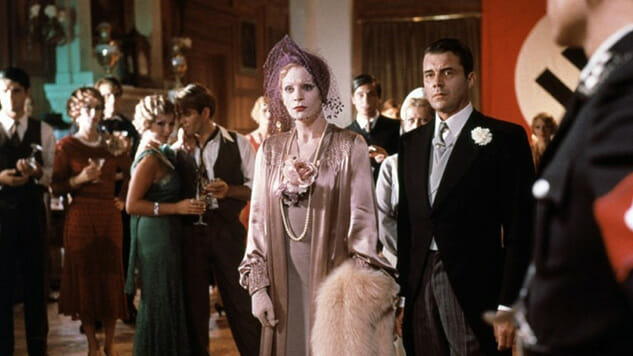The Damned and Fascism’s Queer Aesthetics

“Meet the dapper white nationalist riding the Trump wave,” the headline of a Mother Jones profile cheerily proclaimed in late November 2016. Photographed in a posh elevator with mirrors on the perimeter, white nationalist Richard Spencer’s expression is that of someone in a standoff with the so-called snowflakes. While the adjective “dapper” has since been removed, and Spencer’s notoriety fluctuated within mainstream news media outlets, the reflex to describe the former philosophy grad student from Boston is not unprecedented. Not only is it not uncommon, it appears considering the appeal of fascist aesthetics and their eroticization is right on time.
Milo might (finally) be a pariah, Chadwick Moore might not find a home in a Williamsburg bar anytime soon and former (current?) Twink 4 Trump Lucian Wintrich might have trouble waving around his (questionable) press credentials, but the homoerotics of fascism are here again.
And, at least for Ivo van Hove’s sake, not unironically. The Belgian avant-garde theatre director is bringing his critically acclaimed adaptation of Luchino Visconti’s 1969 film—a tale of political, financial, and familial corruption—The Damned to New York for a limited 11-day engagement. The Damned is a button pusher and, among other things, a polarizing depiction of an amoral, sexually deviant nephew named Martin (Helmut Berger) whose hobbies include blackmail, Oedipal complexes and finding comfort in both Nazi garb and Marlene Dietrich drag. Martin is no blue angel.
The Essenbeck family, nouveau riche industrialists that have sold their business and souls to the Nazi party, perform for their greased up servants on a medium-sized stage in one of the many rooms in their mansion, sitting pretty while the rest of the world falls apart. The room seems to cave in on itself from all the decadence. Everyone looks beautiful, even the portly patriarchs—but the most beautiful of all? Martin has drawn-on, pencil thin eyebrows, his face caked in white makeup and blue eyeshadow. He wears a curly blonde wig, black fishnet stockings and heels, topping off his dessert of a presentation with a top hat painted in glitter and a feather boa draped around his neck with a, ahem, devil may care manner. Martin looks like a nightmarish mishmash of Dietrich in The Blue Angel, Shanghai Express and Blonde Venus, plus the Dietrich-inspired Fassbinder (anti-)heroine Lola, gamely played by Barbara Sukowa. Better yet, Martin looks like however John Waters would conjure Dietrich in one of his films: slightly off, but still sexy and diabolical.
Even when his father, the greedy and Hitler-hating Baron Joachim von Essenbeck (Albrecht Schoenhals), tries to interrupt the performance with news of a bombing in Berlin, Martin plows on with the show. He attempts to regain the eyes of his family another two times to little success, but at least he has the spotlight on him. As Visconti’s Krupp-inspired family begins to unravel, particularly after the death of patriarch Joachim throws the future of their steel business into the air, Martin remains beautiful, tortured, sadistic. Berger’s cheekbones are smooth and chiseled, the face softer and marginally more androgynous than someone like David Bowie. He sleeps with his mother, molests his young cousin and the Jewish girl next door, tries to wage internal political war in the family, and, between the crisp Italian suits and the sharp, imposing leather of the SS uniform, looks fabulous all the while.
Yes, it’s incredibly un-PC to say such a thing as Martin, a queer whose transgressions play off the worst stereotypes with which LGBTQ people have been associated, looks hot when he’s also, like, literally a fascist. As a matter of fact, Visconti goes out of his way to make his Aryan boys look as attractive as possible, freewheeling between the model-ready Essenbeck family to a team of Nazi youth and seniors at a party that, in what amounts to a 17-minute sequence, transitions from a celebration, to a drunken party, to a drunken party with many of the svelt brown coats in drag, to an orgy, to a massacre. Visconti’s imagery is both in adoration and complete disgust at how beautiful, how perfect and how ideal these men are. Martin and the Nazi boys Visconti shoots are neither the first nor the last queer or queer-adjacent fascist men to be eroticized; there are cultures and subcultures fascinated with how fascism’s aesthetics are eroticized.
One of the most well known cult examples of this is Charlotte Rampling in Liliana Calvani’s The Night Porter, a provocation in leather and boots. The film tells of a Holocaust survivor rekindling her sadomasochistic relationship with her lover Dirk Bogarde (both actors were in The Damned), a former SS guard now working at a hotel. We watch her dance and sing wearing little else but suspenders, elbow length black leather gloves and an SS uniform hat.
-

-

-

-

-

-

-

-

-

-

-

-

-

-

-

-

-

-

-

-

-

-

-

-

-

-

-

-

-

-

-

-

-

-

-

-

-

-

-

-








































